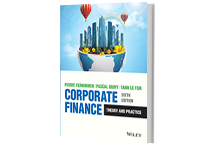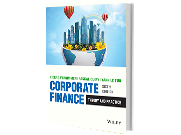Comment, question or quotation of the day
10-09-2025 : Sabadell: we are never better than when under pressure
The Catalan bank presented its strategic plan a few days ago to help it escape the clutches of BBVA, which launched a hostile takeover bid more than 14 months ago. As things stand, this bid is unlikely to succeed, with the offer price 13% below Sabadell's share price.
To convince its shareholders not to tender their shares to BBVA's offer, Sabadell has promised to return all equity generated by its results in excess of 13% of its weighted average assets (CET1 ratio) through dividends (for 60% of the results) or share buybacks for the remainder.
This is at the heart of the capital allocation process.
Sabadell's management and shareholders consider themselves comfortable with a financial structure in which their bank's risk-weighted assets are financed with 87% debt and 13% equity (compared with a prudential minimum requirement of 9.4%). Keeping equity in excess of this 13% inevitably means investing it in risk-free monetary assets (which are not included in the CET1 ratio calculation), as it cannot be used to grant additional loans to existing or new customers (which would eliminate this excess equity).
Of course, it would be preferable for Sabadell to use its equity above the 13% ratio to grant new loans. But trees do not grow to the sky, and in a mature sector such as universal banking in Europe, there are physical limits to the expansion of a loan portfolio, unless one is willing to accept bad risks. It is therefore preferable to return this new equity, generated by earnings, to Sabadell's shareholders via dividends or share buybacks, rather than using it to destroy value, either through losses on defaulted loans or through investments that are certainly risk-free but offer a much lower rate of return than that demanded by shareholders.
It is up to shareholders to reinvest this equity capital, which Sabadell does not need, in companies that do need equity capital to finance their expansion into new markets. For example, by subscribing to the capital increase of Iberdrola, the Spanish energy company, which raised €5 billion on the same day to continue its expansion in the construction of electricity networks, particularly in the United Kingdom and the United States.
Keeping money circulating is the best guarantee that pockets of inefficiency and waste will not develop, and that innovators in developing or mature sectors will find the equity capital they need. Dividends and share buybacks are simply tools to achieve this goal of optimising capital allocation.
09-09-2025 : Size discount and illiquidity discount are like two sides of the same coin.
Eduniversal, listed on Euronext Access (formerly Marché Libre, whose reputation Euronext sought to improve by giving it its name), has sales of €4.6 million and net income of €1.1 million with a team of 17 people working on its business of ranking business schools. I am not a shareholder.
On 6 August, it launched its public withdrawal offer, approved by Euronext.
The CEO and founder of Eduniversal, who owns 90% of the shares, chose a chartered accountant to value his company at €3.1 million. This valuation contains several shortcomings that left Euronext unmoved, assuming its services even read it:
1/ A cost of capital of 19.5%!
For a company with a beta of 1 and an average cost of capital in the economy of around 8%, one can only be surprised by 19.5%! The expert arrives at this truly astonishing figure by adding a size premium of 10%. He does not refer to it as a liquidity premium, as this would be incongruous in a takeover bid that offers liquidity to shareholders. But isn't the size premium for small companies just another name for a liquidity premium? After all, a small company will necessarily have low liquidity. But this so-called "size" premium is very useful in justifying the offer price, which otherwise would have had to be nearly four times higher with a cost of capital of 8%, or twice as high if 12% had been used.
2/ Omission of available cash in the DCF
While the expert remembers to add cash flow in the EBITDA multiples method, he forgets to do so in the DCF method (!), thereby underestimating this value by 11%.
3/ Outdated accounts
The valuation is based on certified accounts, the most recent of which date from 30/9/23, and on accounts as at 30/9/24 that are described as "provisional" and are not certified! Meanwhile, the 2025 accounts, which are now closed as at 31 March, have been available since the end of June 2025 (as they must be submitted to the tax authorities within 3 months).
Any evaluator relies on recent certified historical accounts. An expert, who is not independent in name only, would have insisted on working with these accounts, available since the end of June 2025, even if it meant delaying the launch of this delisting by several weeks, rather than working with the uncertified "provisional" accounts as at 30/9/24. Who can be convinced that there was an absolute urgency to launch this delisting on 6 August, unless, of course, the accounts as at 31 March 2025 are better than the "provisional" accounts as at 30 September 2024?
Conclusion
Unfortunately, simply changing the name of a market is not enough to put an end to shameful practices, as illustrated by the delisting of MAB (of which I am a shareholder) before the summer. For this to happen, Euronext would need to devote time to the issue and use its powers. The delisting of Eduniversal on 6 August with Euronext's agreement is yet another unfortunate example of this.


Glossary
The Vernimmen.com glossary provides definitions for a couple of thousands of financial, stock market or economic terms.
This financial dictionary allows beginners to progress in their learning of finance and to experts to cease the precise meaning of a sentence.

Quiz
The Vernimmen.com Quiz offers over 300 questions with answers to progress in your understanding of finance and to test your knowledge.
Questions are sorted by key topics (financial analysis, investment and stock markets, value, financial engineering and financial management).

Survey
We frequently ask our readers to give us their point of view on a specific topic.
You will find here the current survey with the to-date status of answers as well as past polls.

Financial data
Thanks to our partner Infinancial, we can offer on this page financial data on over 16 000 groups around the world.
Updated several times a year, this database offers information sometimes hard to find elsewhere (beta, …)
The Vernimmen.com Letter
Number 166 of July 2025
News : king equity great again or making European financial markets more attractive (2/2)
Statistics : World corporate income tax rates
Research : The survival of teams of inventors during bankruptcies
Q&A : Who said what?
COMMENTS : Comments posted on Facebook
COMMENTS : Answers to Who has said what?



